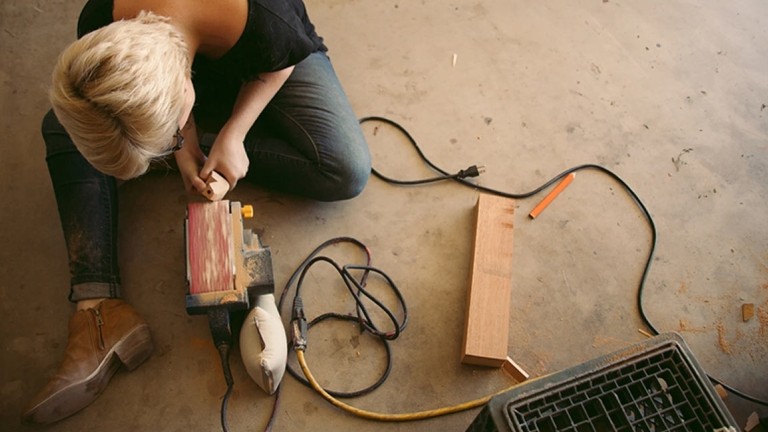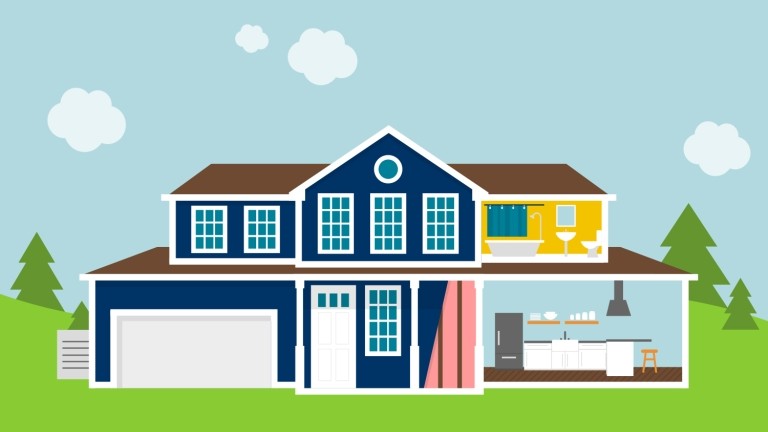15- and 30-year fixed-rate mortgages
Whether you’re a first-time homebuyer, refinancing your home, or looking at investment property, 15- and 30-year fixed-rate mortgages are excellent ways to make your dream fit with your budget. At OCCU, you’ll find some of the most competitive mortgage rates in Oregon, with low- and no-closing-cost options for our fixed-rate loans.
What is a fixed-rate mortgage?
A fixed-rate mortgage is exactly what it sounds like: a mortgage with an interest rate that doesn’t change over the life of the loan. Because the interest rate doesn’t fluctuate, payment amounts and the duration of these fully amortizing mortgage loans are also fixed. For example, if you get a 30-year mortgage on a $325,000 home at 3.75 percent, that interest rate and monthly payment will stay the same for the entire 30 years, regardless of how interest rates change over the three decades. Unlike other types of loans in which the interest rate will adjust according to an index, fixed-rate mortgages give homebuyers the assurance that you’ll have a set mortgage that works with your unique financial situation. Fixed-rate mortgages come in several standard term lengths, from as short as 10 years to as long as 50-year terms. The most common are 15- and 30-year mortgages.
How to qualify for a fixed-rate mortgage
Just as with any loan, you must show that you qualify to get a 15- or 30-year fixed-rate mortgage. Going through the application process only to find out you don’t make enough money or you have too much debt to qualify is both disheartening and not a good use of your valuable time. Getting your finances in order ahead of time will save you stress in the long run. In general, to qualify for a mortgage loan, you’ll need to show the following:
- Your income is sufficient to make a mortgage payment.
- Your income is likely to continue.
- You have a good credit history, as shown by your credit score.
- Your debt-to-income ratio is low.
- You have savings with which to make a down payment.
If you are refinancing your home, you’ll also need to have enough equity built up in the property to qualify. Equity is the difference between the value of the home and the amount you owe on it. The value is based on the current appraised value, not on what you originally paid for your home.
A knowledgeable loan officer is your best resource when you’re comparing loans and trying to decide if home ownership is for you. We're happy to sit down and talk you through the process before you apply or set a plan to get you in a place to qualify. To get started simply contact one of our mortgage team online today.
Advantages of fixed-rate mortgages
A fixed-rate mortgage loan gives homeowners the ability to set a budget and stick to it, thanks to predictable, consistent monthly payments that never change over the lifetime of the loan (unless you refinance or make other changes to the terms of your loan). While changes from escrow (such as an increase in property taxes, insurance premiums or fees from your homeowner association) may cause small changes in your monthly payment, the interest rate that you locked in at the time you got your mortgage remains the same. Most government and conventional loan programs offer fixed-rate loans with no prepayment penalties if you refinance or sell your property. With OCCU, you also get competitive rates and low- or no-closing-cost options.
These loans are fully amortized, meaning the monthly payment covers both the principal and the interest on your loan—you’ll have paid for your property in full at the end of the loan period. This, plus the predictability of the monthly payments, help make fixed-rate loans some of the most popular loans available today.
Disadvantages of fixed-rate mortgages
The disadvantages of a fixed-rate mortgage are, ironically, the same as the advantages—they give you a consistent monthly payment that doesn’t change over time. Particularly with shorter-term loans, this limits your flexibility if you find yourself in a situation in which you need to hold back some money in any given month due to unforeseen circumstances. Remember, the shorter the term of the loan, the higher the monthly payment, and that payment remains the same even if life and your finances get complicated.
At the other end of the spectrum, a longer-term fixed-rate loan, like our 30-year mortgage, gives you lower monthly payments and therefore frees up some money in your monthly budget for those unforeseen circumstances that may occur. This makes home ownership more affordable for the average American. However, this type of loan has a higher interest rate, which means you initially pay less toward your principal, but this costs you significantly more in interest over the long term. For example, if you purchase a home with a 30-year fixed-rate mortgage and you find yourself in the position of wanting to sell your home after only a few years, you may find that you haven’t built up much equity because the majority of your monthly payment was going toward interest.
So how do you choose which fixed-rate loan is right for you?
You can talk to one of our loan officers to determine if a fixed-rate mortgage is right for you, or if you might be better served by an adjustable-rate mortgage (ARM), in which you get a low fixed interest rate for a certain number of years, and then the loan converts to an annually adjusted rate based on an index. In a fully amortizing ARM, the monthly payment is still calculated to pay off the entire mortgage balance at the end of the term, but after the fixed interest rate period is done, the interest rate and payment adjusts annually for the remaining term of the loan. This can be a particularly good option if you know you’re going to sell the home in five or 10 years and want to be sure you’re building equity at a faster rate.
When you’re choosing between a 15- and 30-year fixed-rate mortgage, the choice really comes down to affordability and how long you intend to stay in the home. A 15-year mortgage saves you money in interest because of lower interest rates for this loan type and because of the shorter term of the loan, but it costs significantly more in terms of your monthly payments. Meanwhile, while a 30-year mortgage does cost more in interest over the long term, it also makes home ownership affordable for many Americans because it spreads the loan out over a much longer period, making monthly payments much more affordable.
Who are the right homebuyers for a 15-year fixed-rate mortgage? If you can afford the higher monthly payments, this loan type is the best deal over the long run. Just as with a 30-year fixed-rate mortgage, you have the predictability of a consistent interest rate and monthly payment, but because the loan period is half as long, you pay significantly less interest and put more toward the principal sooner, saving you thousands of dollars over the life of the loan.
The 15-year fixed-rate loan is also a great choice if you’re not planning on staying in the same home for a long time. Paying off your loan in half as long as a standard 30-year mortgage means you build equity in your home at a faster pace, so you’ll have more to work with when it comes time to sell.
The risks with a 15-year loan come into play if your financial situation changes in a way that means you can no longer afford the higher monthly payments that come with a shorter term, fixed-rate mortgage. The higher minimum payment gives you less flexibility with your monthly budget, so if your finances are affected by job loss, medical bills or other unexpected circumstances, you may find yourself with a mortgage you can no longer afford.
These factors are why the average American home buyer typically chooses a 30-year fixed-rate mortgage. By spreading the loan over a longer period, you’ll pay more interest, but you’ll also have more affordable monthly payments, which also gives you the option to borrow more and get a larger home or property at the same monthly payment. The other option here is to have a lower monthly payment for the same loan amount. For the average homebuyer, this opens up more possibilities in the market. Also, there’s no reason that you have to take 30 years to pay off this type of fixed-rate mortgage. Pay more each month and you can still pay off your home in 15 years if you so choose, but you retain the kind of flexibility you might need if money gets tight one month or you find yourself with unexpected expenses. This way, you can have the advantages of a 15-year mortgage without locking yourself into a higher monthly payment.
Refinancing
If interest rates are significantly lower now than they were when you purchased your home, you may qualify to refinance and take advantage of the new, lower rates. If your financial situation has changed since you purchased your property, you also may find that it would benefit you to change the type of loan you have, either to spread out the payments and make your monthly costs lower, or to take a shorter-term mortgage that will pay off your home sooner.
You must have enough equity built up in your home in order to qualify for refinancing. This is called the loan-to-value ratio ratio (LTV): the percentage you get when you divide the amount of the mortgage lien by the current appraised value of your home. For instance, if the current appraised value of your home is $210,000, and you’ve paid $20,000 to the equity of the property, you still owe $190,000 and your LTV is 90.48 percent. If you have a second mortgage or another lien on the property, these also come into the equation.
You can speak to one or our loan officers about the LTV on your property. Schedule a free consultation and one of them will be glad to help you determine if this is the right time for you to refinance.
Shopping for the best mortgage loan
Before you lock yourself into a loan, read our blog about shopping for the best mortgage. Just as you shop for the perfect home that best meets your needs and your budget, you shouldn’t take the first mortgage loan that comes your way. Mortgage brokers are certainly one good option, but when you’re researching loan types, be sure to also consider whether a mortgage broker has your best interests at heart. Credit unions, like OCCU, offer the same loan programs and the same competitive rates that mortgage brokers do, and you have the added benefit of knowing you’re working with a member-owned, not-for-profit business whose primary function is to promote the financial well being of its members. You should also consider the fees associated with your loan and how you feel about the service you receive.
Fifteen- and 30-year fixed-rate mortgages are two of the most popular home loans for good reasons. They give homebuyers the ability to stay within your budget by creating consistent, predictable monthly payments. They are fully amortizing, making them some of the most stress-free loans; you know your monthly payment covers both the principal and the interest on your loan, and you’ll have your property paid in full at the end of the loan period. You can set the length of the loan term so that you’re paying higher monthly payments and building equity faster, or spreading your payments out over a longer term in order to create lower monthly payments for the best affordability. You have options for fixed-term loans through both government and conventional loan programs, and they are available for a wide variety of people including first-time home buyers, investors, veterans, people who qualify for U.S. Department of Agriculture loans, FHA loans and more. At OCCU, you also get competitive rates and low- or no-closing-cost options.
If a fixed-rate mortgage sounds like the best way for you to purchase your home, contact us today and let’s talk about your options.
Learn more about the terms of our fixed-rate mortgage options and let’s talk about your options.


